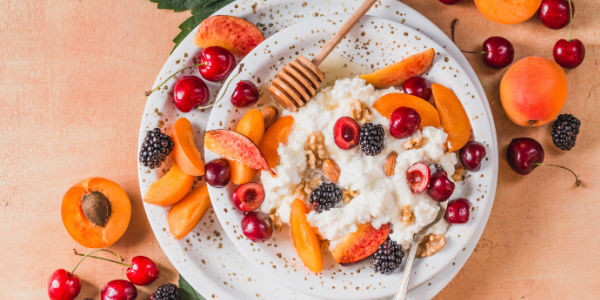
The immune system essentially creates a war zone in a working, healthy body. Acting as the first line of defense, strong immunity can help combat any foreign substance trying to enter the body.
There are many ways to strengthen the immune system, including getting sufficient sleep and exercising regularly. Protecting from acute and chronic stress by practicing positive coping techniques can help, too.
But the importance of what we choose to eat should not be undermined. In fact, a healthy diet has a great impact on the immune system and nutritious foods will keep the body fighting.
How to Boost Your Immune System Naturally with Food
All-in-all, a balanced diet offering variety helps ensure the body is equipped with adequate nutrients to stay healthy. Focus on whole grains, fresh produce, lean proteins, and healthy fat sources.
These 10 healthy foods to boost your immune system likewise offer immense health benefits. This, in turn, can lower the risk of developing not only the cold and flu but other chronic illnesses.
1. Chicken
When not feeling well, there is much reason why a bowl of chicken soup tends to save the day. But chicken can help protect from catching a cold well before feeling sick, mostly related to the protein it offers.
Protein is important for a number of reasons, including immune health. The macronutrient helps produce antibodies, which helps the body fight against foreign invaders known as antigens.
2. Beef
Beef is protein-rich and supplies iron and zinc, both of which can boost your immune system.
Too little or too much iron and zinc have harmful consequences such as anemia. However, their balance can help lead to normal immune responses in the body.
Opting for grass-fed beef may also be of benefit. Compared to grain-fed, grass-fed beef has a grander nutrient profile and offers omega-3 fatty acids. Omega-3s are a type of healthy fat that may boost immune function.
3. Oysters
Oysters are known to be one of the best natural testosterone supplements. But they are likewise helpful for boosting the immune system.
Oysters offer beneficial nutrients as deep as the sea, including protein, omega-3s, iron, and zinc. Zinc is an essential mineral for reproducing white blood cells and wound healing.
4. Eggs
Egg whites are rich in protein, while the yolk contains high amounts of vitamin D.
Vitamin D is noteworthy for its classic effects on calcium and bone maintenance. However, this fat-soluble vitamin also plays a role in immunity. Vitamin D deficiency has been shown to increase susceptibility, or likely to be harmed, to infection.
Eggs also contain vitamin B12, a B vitamin that works with folate to keep immune-fighting compounds active and strong.
5. Carrots
The beta carotene and vitamin A found in carrots can contribute to a healthy immune system.
Beta carotene is a red, orange, and yellow pigment naturally sourced from plants such as fruits and vegetables. It is converted to vitamin A in the body, which is an essential vitamin.
Consuming vitamin A sources has been linked to improved wound healing. A deficiency in vitamin A is correlated with poor wound healing as well.
6. Berries
Whereas the body can produce antioxidants, the bulk of existence comes from foods consumed. Antioxidants are rich in fruits and vegetables, including berries.
Antioxidants give berries their deep, vibrant color and protect the body from free radicals and cell damage. These properties may reduce inflammation and boost the immune system.
Antioxidants may also lower the risk of certain health conditions, including Alzheimer's disease, heart disease, and cancer.
7. Spinach
Again, folate and vitamin B12 work together to maintain active immune responses. Folate is significant in spinach.
Spinach is also a source of vitamin A and E, immune-boosting vitamins. The antioxidant property of vitamin E helps the cells against damage as well.
8. Grapes
Like the colorful blueberries, grapes also contain antioxidants.
Grapes contain selenium and vitamin C, both acting as antioxidants. Vitamin C has also been recognized for stimulating white blood cells, key immune cells that help the body fight against infections.
The potent and powerful antioxidant properties of selenium can lead to a stronger immune system. Selenium deficiency, compared to adequate selenium intake, may result in weaker immune responses.
9. Yogurt
The digestive tract acts as a barrier against "bad" bacteria, which can bombard the body and create illness.
The probiotics sourced from yogurt are considered to be "good" bacteria. Research shows probiotics are likewise helpful in protecting from foodborne illnesses and preventing colds and infection.
Common sources of probiotics include yogurt, kefir, sauerkraut, and kombucha. Also, look for names like Lactobacillus and Bifidobacterium on the ingredient label.
10. Oranges
Both vitamin C and vitamin D are found in brightly colored oranges and orange juice. Vitamin C is an antioxidant that protects against cell damage.
The properties are vitamin D helps to decrease inflammation and increase anti-inflammatory responses.
References:
Aranow C. Vitamin D and the Immune System. Journal of investigative medicine : the official publication of the American Federation for Clinical Research. 2011;59(6):881-886. doi:10.231/JIM.0b013e31821b8755.
Ashraf R, Shan NP. Immune system stimulation by probiotic microorganisms. Critical Reviews in Food Science and Nutrition. 2014;54(7):938-56.
Gutiérrez S, Svahn SL, Johansson ME. Effects of Omega-3 Fatty Acids on Immune Cells. International Journal of Molecular Sciences.
Hoffmann PR, Berry MJ. The influence of selenium on immune responses. Molecular nutrition & food research. 2008;52(11):1273-1280. doi:10.1002/mnfr.200700330.
Immunity In Depth. Linus Pauling Institute. http://lpi.oregonstate.edu/mic/micronutrients-health/immunity. Published January 2, 2020.







